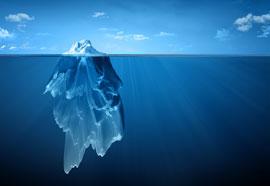The tip of the iceberg
Actinides are used and produced by the nuclear industry and must be well understood to ensure they are used safely. Understanding these materials is difficult because of their complex electronic structures, which lead to complicated phases and diverse properties that push the limits of current theoretical models. Moreover, actinides and in particular transuranics are relatively new materials, only available in a small number of licensed laboratories worldwide. As their basic chemical and physical properties are not well known - the bottom part of the iceberg is still hidden.

Underpinning theory
Theory needs to be underpinned by experiments: the determination of the ground state properties (i.e. at zero-temperature) and their evolution with temperature, but also applied pressure and magnetic field is crucial to assess the validity of ab initio calculations with the aim to describe materials in various conditions.

Exploring fundamental properties
The rarity, reactivity, and radioactivity of these materials pose unique challenges to experimental work. However, in our laboratories, we are able to cool an actinide sample down to 0.5 Kelvin, apply a magnetic field up to 14 Tesla or a pressure up to 20 gigaPascal and measure various physical properties at such extreme conditions.

Access to JRC's unique infrastructure for EU scientists
The Actinide User Laboratory, one of the few civil laboratories in Europe where basic properties of actinide materials can be investigated, is the only user laboratory equipped for performing experiments on radioactive actinide materials under extreme conditions, and provides an array of world-class facilities, including those for samples preparation and a range of characterisation and investigation tools.
These facilities are made available to the scientific community, with the support and expertise of JRC staff and a service facilitating such aspects as the secure transport of samples and a radioprotection survey of users, according to the latest European and German safety standards.
The Actinide User Laboratory is open to scientists from the European Union whose home institutions do not have the infrastructure necessary to handle actinide materials.
